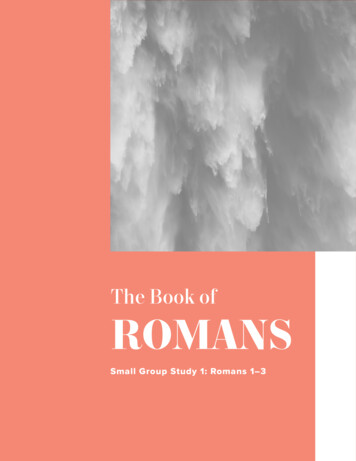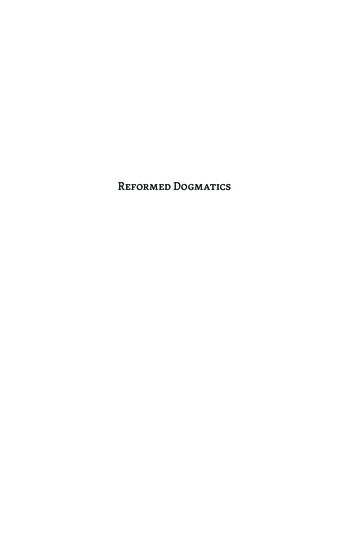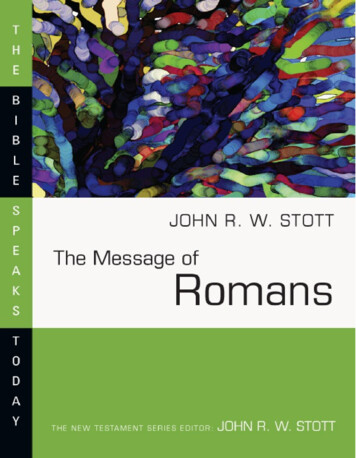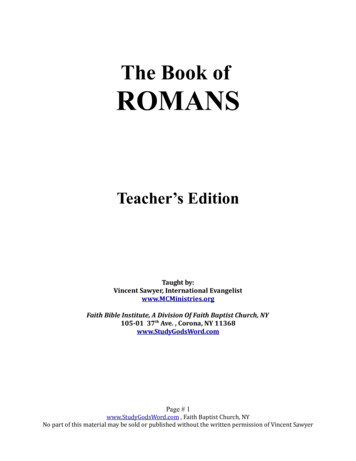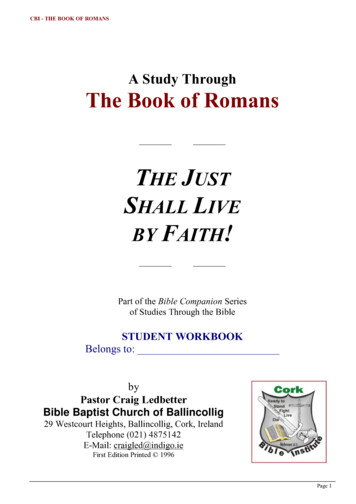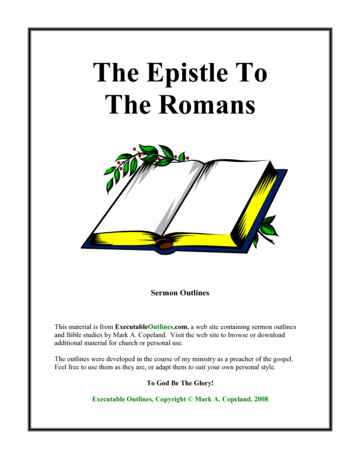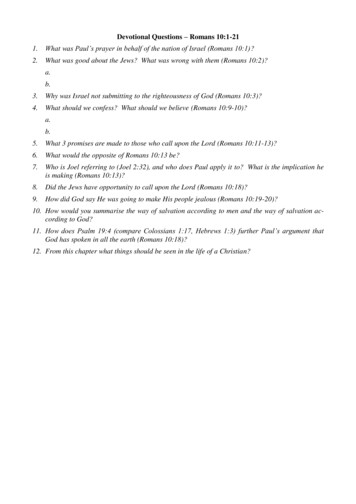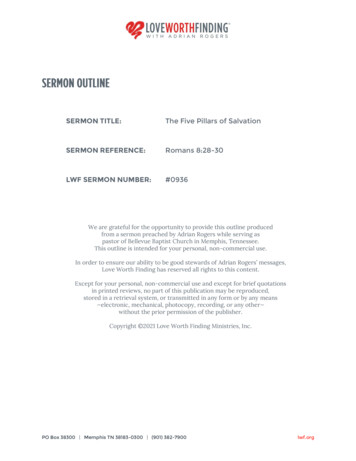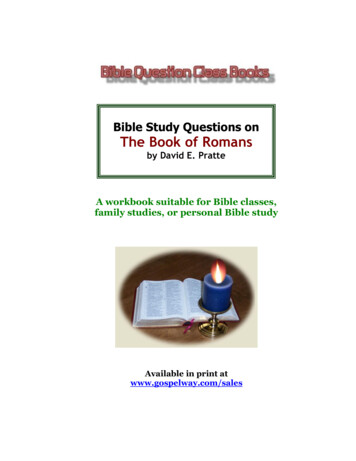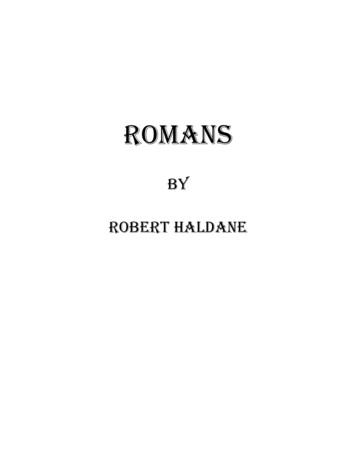
Transcription
RomansByRobert Haldane
Copyright (Public d on the Web)
2TABLE OF CONTENTSForwardPrefaceIntroductionChapter 1.Part 1.Romans 1:1-15Part 2.Romans 1:16-3Chapter 2.Romans 2:1-29Chapter 3.Part 1.Romans 3:1-20Part 2.Romans 3:21-31Chapter 4.Romans 4:1-25Chapter 5.Romans 5:1-21Chapter 6.Romans 6:1-23Chapter 7.Romans 7:1-25Chapter 8.Romans 8:1-39Chapter 9.Romans 9:1-33Chapter 10. Romans 10:1-21Chapter 11. Romans 11:1-36Chapter 12. Romans 12:1-21Chapter 13. Romans 13:1-14Chapter 14. Romans 14:1-21Chapter 15. Romans 15:1-33Chapter 16. Romans 16:1-27ConclusionFootnotesPublishers Notes
3EXPOSITIONOF THEEPISTLE TO THE ROMANSBYROBERT HALDANE
4FOREWORDIt is with particular pleasure that I recommend this commentary on theEpistle to the Romans.I do so for many reasons.First and foremost is the fact that I have derived such profit and pleasurefrom it myself. I always find it very difficult to decide as to which is thebetter commentary on this Epistle, whether that of Charles Hogde or thisby Haldane. While Hodge excels in accurate scholarship, there is greaterwarmth of spirit and more practical application in Haldane. In any case,both stand supreme as commentaries on this mighty Epistle.However, that which gives an unusual and particularly endearing value tothis commentary is the history that lies behind it. In 1816 Robert Haldane,being about fifty years of age, went to Switzerland and to Geneva. There,to all outward appearances as if by accident, he came into contact with anumber of students who were studying for the ministry. They were allblind to spiritual truth but felt much attracted to Haldane and to what hesaid. He arranged, therefore, that they should come regularly twice a weekto the rooms where he was staying and there he took them through andexpounded to them Paul’s Epistle to the Romans. One by one they wereconverted, and their conversion led to a true Revival of religion, not only inSwitzerland, but also in France. They included such men as MerleD’Aubigné the writer of the classic “History of the Reformation,” FrédéricMonod who became the chief founder of the Free Churches in France,Bonifas who became a theologian of great ability, Louis Gaussen theauthor of “Theopneustia,” a book on the inspiration of the Scriptures andCésar Malan. There were also others who were greatly used of God in therevival. It was at the request of such men that Robert Haldane decided toput into print what he had been telling them. Hence this volume. And onecannot read it without being conscious of the preacher as well as theexpositor.What a distinguished French minister Dr. Reuben Saillens says of whatbecame known as “Haldane’s Revival” can be applied with equal truth to
5this commentary: “The three main characteristics of Haldane’s Revival, asit has sometimes been called, were these:(1) it gave a prominent emphasis to the necessity of a personalknowledge and experience of grace;(2) it maintained the absolute authority and Divine inspiration of theBible;(3) was a return to Calvinistic doctrine against Pelagianism andArminianism. Haldane was an orthodox of the first water, but hisorthodoxy was blended with love and life.”God grant that it may produce that same “love and life” in all who read it.D. M. LLOYD-JONESMarch 1958
6PREFACEALL Scripture is given by inspiration of God. Every page of the sacredvolume is stamped with the impress of Deity, and contains aninexhaustible treasure of wisdom, and knowledge, and consolation. Someportions of the word of God, like some parts of the material creation, maybe more important than others. But all have their proper place, allproclaim the character of their glorious Author, and all ought to beearnestly and reverentially studied. Whatever be their subject, whether itrelates to the history of individuals or of nations, whether it contains thewords of precept or exhortation, or whether it teaches by example, all isprofitable for doctrine, for reproof, for correction, for instruction inrighteousness. But while every part of the word of God demands the mostserious attention it is not to be doubted that certain portions of the sacredvolume call for more frequent and deeper meditation. In the OldTestament, the Book of Psalms contains a summary of all Scripture, andan abridgment of its most important instructions and sweetestconsolations. In the New Testament, the Epistle to the Romans is entitledto peculiar regard. It is the part of Scripture which contains a detailed andsystematic exhibition of the doctrines of Christianity. The great truthswhich are embodied and inculcated in every other part of the Bible, arehere brought together in a condensed and comprehensive form. Moreespecially, the glorious doctrine of justification by faith is clearlyunfounded and exhibited in the strongest light.The Epistle to the Romans has always attracted the peculiar notice ofthose whose study has been directed to the interpretation of Scripture. Tothe this portion of the Divine record, all who look for salvation by gracehave constantly appealed, and here they have a rich mine of evidence, alikesolid and inexhaustible No considerable difference of interpretation hasever been given of its contents by those who have renounced their ownwisdom, and determined to follow implicitly the obvious meaning of theword of God. This Epistle has been equally an object of attention to thosewho admit the authority of Scripture, but follow their own wisdom informing their system of religious doctrine. Salvation by grace and salvationby works are so incompatible with each other, that it might well be
7supposed no attempt would ever be made to bring them into harmony.Still the attempt has been made. Human wisdom cannot receive thedoctrine of the Epistle to the Romans, and men professing Christianitycannot deny it to be a part of Scripture. What, then, is to be done? Acompromise is proclaimed between the wisdom of man and the revelationof God. All the ingenuity of Mr. Locke, one of the most acute and subtlemetaphysicians that ever appeared, has been exerted to bring the doctrineof Paul into accordance with human science. Like him, many others havelabored to give a view of this Epistle that may reconcile human merit withdivine grace.Nothing is more manifest than the direct opposition between the doctrineof inspiration, as unfolded in the Epistle to the Romans, with respect tothe state and prospects of mankind, and the doctrine of this world’sphilosophy. Paul contemplates all men in their natural state as ruined bysin, and utterly unable to restore themselves to the Divine favor.Philosophers, on the contrary, survey the aspect of society with real oraffected complacency. They perceive, indeed, that imperfection andsuffering prevail to a considerable extent; but they discover a vastpreponderance of happiness and virtue. They cannot deny that man is of amixed character; but this is necessary, in order that his virtue may be hisown, and that, in passing onwards to the summit of moral excellence, hisstrength of principle may be more illustriously displayed, and hishappiness promoted by his progress in virtue, as well as by hisadvancement in knowledge. Nor is this remarkable difference altogetherconfined to philosophy. Even many professors and expounders ofChristianity cannot entirely accord with the Apostle Paul in hisrepresentations of human nature. Man, it seems to them, is not socompletely lost but that he may do something to regain the Divine favor;and if a sacrifice were necessary for the expiation of sin, its blessing mustbe equally bestowed on all mankind.The doctrine of justification, in particular, so far transcends the powers ofour discovery, that men are ever attempting to set it aside, or to mold itinto accordance with their own preconceived notions. How wonderful isthe contrast between the justification of which this Apostle treats, and thejustification which critical ingenuity has often extorted from his Epistles!While Paul speaks of the believer as possessing a righteousness perfectly
8commensurate to all the demands of the law, and standing at the bar ofGod spotless and blameless, human wisdom has contrived to exhibit hisdoctrine as representing salvation to be the result of a happy combinationof mercy and merit.The doctrine of salvation by faith without works has ever appeared to thewise of this world not only as a scheme insufficient to secure the interestsof morality, but as one which disparages the Divine authority. Yet its goodeffects are fully demonstrated in every age; and while nothing but thedoctrine of salvation by grace has ever produced good works, this doctrinehas never failed of its designed object. In all the ways of God there is acharacteristic wisdom, which stamps them with the impress of divinity.There is here a harmony and consistency in things the most different inappearance; while the intended result is invariably produced, although in away which to man would appear most unlikely to secure success.The mind of every man is by nature disaffected to the doctrine of thisEpistle; but it is only in proportion to the audacity of his unbelief that anyone will directly avow his opposition. While some, by the wildestsuppositions, will boldly set aside whatever it declares that opposes theirown preconceived opinions, others will receive its statements only withthe reserve of certain necessary modifications. Thus, in the deviationsfrom truth in the exposition of its doctrines, we discover various shades ofthe same unhallowed disregard for the Divine testimony.The spirit of speculation and of novelty which is now abroad, loudly callsupon Christians to give earnest heed to the truths inculcated in the Epistleto the Romans. There is hardly any doctrine which has not been of lateyears exposed to the corruptions and perversions of men who profess tobe believers of Divine revelation. Many, altogether destitute of the Spiritof God and the semblance of true religion, have nevertheless chosen theword of God and its solemn and awfully momentous truths as the arenaupon which to exercise their learning and display their ingenuity. Inconsequence of the Scriptures being written in the dead languages, there isdoubtless scope for the diligent employment of critical research. But if itwere inquired how much additional light has been thrown upon the sacredvolume by the refinements of modern critics, it would be found to bear avery small proportion to the evil influence of unsanctified learning applied
9to the holy doctrines of revelation. It has become common, even amongChristians to speak of the critical interpretation of Scripture as requiringlittle or nothing more than mere scholarship; and many seem to supposethat the office of a critical and that of a doctrinal interpreter are so widelydifferent, that a man may be a safe and useful critic who has no relish forthe grand truths of the Bible. There cannot be a more lamentable delusion,or one more calculated to desecrate the character and obscure the majestyof the word of God. To suppose that a man may rightly interpret theScriptures, while he is ignorant of the truths of the Gospel, or disaffectedto some of its grand fundamental doctrines, — to imagine that this can beto him a useful or even an innocent occupations — is to regard theseScriptures as the production of ordinary men, treating of subjects ofordinary importance, instead of containing, as they do, the Message of theMost High God, revealing life or death to every soul to whom they come.If the Scriptures have not testified in vain that the carnal mind is enmityagainst God; if we are bound to believe that there is no middle statebetween the Christian and the unbeliever; can we wonder at the manner inwhich they have been perverted, not only by the ignorance, but by theinveterate prejudices, of men from whom the Gospel is hid? Is itreasonable — is it agreeable to the dictates of common sense — to believethat the critical interpretations of such men are not tinged with their owndarkened and hostile views of the Divine character and the Divinerevelation? And yet such is the opinion entertained of the labors of someof the most unenlightened commentators, that their works have obtained acelebrity altogether unaccountable on any principle of Christian wisdom.Christians ought to be particularly on their guard against tampering in anydegree with the word of God. We should never forget that, when we areexplaining any expression of Scripture, we are treating of what are the verywords of the Holy Ghost, as much as if they had been spoken to us by avoice from heaven. The profane rashness of many critics is muchemboldened by the circumstance that men have been employed as theinstruments of the Almighty in communicating His revelation. A sort ofmodified inspiration only is granted to the Scriptures, and they are oftentreated as the words merely of those who were employed as the penmen.When God is thus kept out of sight, little ceremony is used with thewords of the Apostles. That profound reverence and awe with which the
10Scriptures ought to be read and handled, are in many instances too littleexemplified. The poor man’s Bible is the word of God, in which he has nosuspicion that there is anything but perfection. The Bible of theprofoundly erudite scholar is often a book that is not so necessary toinstruct him, as one that needs his hand for alteration, or amendment, orconfirmation. Learning may be usefully employed; but if learning everforgets that it must sit at the feet of Jesus, it will be a curse instead of ablessing. It will raise clouds and darkness, instead of communicating lightto the world.The evil of studying the Scriptures, and commenting upon them with aslittle reverence as a scholar might comment upon the plays ofAristophanes or Terence, has extended itself much farther than might besupposed. This is the spirit in which the Gerrean Neologians have written;and indeed it is to be feared that, as the Neologian form of infidelityoriginated from this profane method of criticizing the Scriptures, so thesame cause may produce the same effect in this country. Certain it is thatworks have been republished or translated here, which are very littlecalculated to uphold the ancient faith of the Church of Christ, or toadvance the knowledge of the truth as it is in Jesus.From present appearances, there is every reason to fear that Britain will beinundated with German Neology. The tide has strongly set in, and unlessthe Christian public be upon their guard, the whole country will bebrought under its influence. It is a solemn thing to be instrumental inushering into more extended notoriety publications that have a tendency tolower the character of the Holy Scriptures, to introduce doubt andconfusion into the minds of those who are weak in the faith, and toembolden others who seek an apology for casting away the fetters ofeducation and authority, and desire to launch out into the ocean of wildand dangerous speculation. While some appearances in Germany of areturn to the Scripture doctrine of salvation by Jesus Christ should begladly hailed by every Christian, yet it must be admitted that those who inthat country seem to have made the greatest advances in the knowledge ofthe Gospel, are still far from being entitled to be pointed out as guides tothe Christians of Great Britain. Their modifications of Divine truth aremanifestly under the influence of a criticism too nearly allied to Neology.There is great danger that in the admiration of German criticism a tincture
11may be received from continental errors. It would be far preferable iflearned Christians at home would pursue truth in a diligent examination ofits own sources, rather than spend their time in retailing the criticisms ofGerman scholars. ‘Their criticisms,’ it is observed by Dr. Carson, ‘arearbitrary, forced, and in the highest degree fantastical. Their learning isboundless, yet their criticism is mere trash. The vast extent of their literaryacquirements has overawed British theologians, and given an importance toarguments that are self-evidently false.’In these days of boasted liberality, it may appear captious to oppose withzeal the errors of men who have acquired a name in the Christian world.The mantle of charity, it will be said, ought to be thrown over mistakesthat have resulted from a free and impartial investigation of truth, and ifnot wholly overlooked, they should be noticed with a slight expression ofdisapprobation. Such, however, was not the conduct of the Apostle Paul.He spared neither churches nor individual when the doctrines theymaintained turned to the subversion of the Gospel and the zeal with whichhe resisted their errors was not inferior to that with which he encounteredthe open enemies of Christianity. He affirms that the doctrine introducedinto the Galatian churches is another Gospel, and twice pronounces acurse against all by whom it was promulgated. Instead of complimentingthe authors of this corruption of the Gospel as only abusing in a slightdegree the liberty of free examination, he decides that they should be cutoff as troublers of the churches. Let not Christians be more courteous inexpressing their views of the guilt and danger of corrupting the Gospel,than faithful and compassionate to the people of Christ who may beinjured by false doctrine. It is highly sinful to bandy compliments at theexpense of truth.The awful responsibility of being accessory to the propagation of error isstrongly expressed by the Apostle John. ‘If there come any unto you, andbring not this doctrine, receive him not into your house, neither bid himGod-speed; for he that biddeth him God-speed is partaker of his evildeeds.’ If the imputation of Adam’s sin and of Christ’s righteousness bedoctrines contained in the word of God; commentaries that labor to expelthem from that word must be grossly pestiferous books, which noChristian ought to recommend, but which, on the contrary, to the utmostof his power, it is his duty to oppose.
12A very dangerous misrepresentation of some of the great doctrines of theEpistle to the Romans has lately come before the public, in a commentaryon that Epistle from the pen of Professor Moses Stuart of America. Asthat work has obtained an extensive circulation in this country, — as it hasbeen strongly recommended, and is likely to produce a considerable effect,— it has appeared proper to make frequent references to his glaringperversions of its important contents. On the same principle, variousremarks are introduced on the well-known heterodox commentary of Dr.Macknight; I have also alluded occasionally to the heretical sentimentscontained in that of Professor Tholuck, lately published.In the following exposition, I have availed myself of all the assistance Icould obtain, from whatever quarter. Especially I have made use ofeverything that appeared to be most valuable in the commentary ofClaude, which terminates at the beginning of the twenty-first verse of thethird chapter. I have also had the advantage of the assistance of Dr.Carson, whose profound knowledge of the original language andwell-known critical discernment peculiarly qualify him for renderingeffectual aid in such a work. As it is my object to make this exposition asuseful as possible to all descriptions of readers, I have not always confinedmyself simply to an explanation of the text, but have occasionallyextended, at some length, remarks on such subjects as seemed to demandparticular attention, either on account of their own importance, or ofmistaken opinions entertained concerning them. As to those whichrequired a fuller discussion than could be conveniently introduced, I havereferred to my work on the Evidence and Authority of Divine Revelation.By studying the Epistle to the Romans, an exact and comprehensiveknowledge of the distinguishing doctrines of grace, in their various bearingsand connections, may, by the blessing of God, be obtained. Here theyappear in all their native force and clearness, unalloyed with the wisdom ofman. The human mind is ever prone to soften the strong features of Divinetruth, and to bring them more into accordance with its own wishes andpreconceived notions. Those lowering and debasing modifications of thedoctrines of Scripture, by which, in some popular works, it is endeavoredto reconcile error with orthodoxy, are imposing only in theory, and may beeasily detected by a close and unprejudiced examination of the language ofthis Epistle.
13INTRODUCTIONTHE Epistle to the Romans was written by the Apostle Paul fromCorinth, the capital of Achaia, after his second journey to that celebratedcity for the purpose of collecting the pecuniary aid destined for the churchat Jerusalem. This appears from the fifteenth chapter, where he says thathe was going to Jerusalem to minister to the saints. ‘For,’ he adds, ‘it hathpleased them of Macedonia and Achaia to make a certain contribution forthe poor saints which are at Jerusalem.’ The Epistle appears to have beencarried to Rome by Phebe, a deaconess of the church at Cenchrea, whichwas the port of Corinth; and we learn from the nineteenth and twentiethchapters of the Acts, and from different parts of the two Epistles to theCorinthians, that, after having remained about three years at Ephesus, Paulpurposed to pass through Macedonia and Achaia, to receive thecontributions of the Corinthians, and afterwards proceed to Jerusalem.As to the period when this Epistle was written, it is certain that it was at atime previous to Paul’s arrival at Rome. On this account, he begins bydeclaring to the disciples there that he had a great desire to see them, andto preach to them the Gospel; that he had often purposed this, but hadhitherto always been prevented. This statement he repeats in the fifteenthchapter. It appears to be earlier in date than the Epistles to the Ephesiansand Philippians, and those to the Hebrews and Philemon, and the Secondto Timothy; for all of these were written during the Apostle’s first orsecond imprisonment at Rome, but later than the two Epistles to theCorinthians. It is generally supposed that it was written in the year 57 ofthe Christian era, about twenty-four years after the resurrection of ourLord.Notwithstanding that this Epistle was written after some of the rest, it hasbeen placed first in order among them on account of its excellence, and theabundance and sublimity of its contents. It contains, indeed, an abridgmentof all that is taught in the Christian religion It treats of the revelation ofGod in the works of nature and in the heart of man, and exhibits thenecessity and the strictness of the last judgment. It teaches the Doctrine ofthe fall, and corruption of the whole human race, of which it discovers the
14source and it’s greatness. It points out the true and right use of the law,and why God gave it to the Israelites; and also shows the variety of thetemporal advantages over other men which the law conferred on them, andwhich they so criminally abused. It treats of the mission of our Lord JesusChrist, of justification, of sanctification, of free will and grace, of salvationand condemnation, of election and of reprobation, of the perseverance andassurance of the salvation believers in the midst of their severesttemptations, of the necessity of inflictions, and of the admirableconsolations under them — of the calling of the Gentiles, of the rejectionof the Jews and of their final restoration to the communion of God. Paulafterwards lays down the principal rules of Christian morality, containingall that we owe God, to ourselves, our neighbors, and to our brethren inChrist, and declares the manner in which we should act in our particularemployments; uniformly accompanying his precepts with just andreasonable motives to enforce their practice. The form, too, of this Epistleis not less admirable than its matter. Its reasoning is powerful andconclusive; the style condensed, lively, and energetic; the arrangementorderly and clear, strikingly exhibiting the leading doctrines as the mainbranches from which depend all the graces and virtues of the Christian life.The whole is pervaded by a strain of the most exalted piety, true holiness,ardent zeal, and fervent charity.This Epistle, like the greater part of those written by Paul, is divided intotwo general parts, — the first of which contains the doctrine, and extendsto the beginning of the twelfth chapter; and the second, which relates topractice, goes on to the conclusion. The first is to instruct the spirit, andthe other to direct the heart; the one teaches what we are to believe, theother what we are to practice. In the first part he discusses chiefly the twogreat questions which at the beginning of the Gospel were agitatedbetween the Jews and the Christians, namely, that of justification beforeGod, and that of the calling of the Gentiles. For as, on the one hand, theGospel held forth a method of justification very different from that of thelaw, the Jews could not relish a doctrine which appeared to them novel,and was contrary to their prejudices; and as, on the other hand, they foundthemselves in possession of the covenant of God, to the exclusion of othernations, they could not endure that the Apostles should call the Gentilesto the knowledge of the true God, and to the hope of His salvation, nor
15that it should be supposed that the Jews had lost their exclusivepre-eminence over the nations. The principal object, then, of the Apostlewas to combat these two prejudices. He directs his attention to the formerin the first nine chapters, and treats of the other in the tenth and eleventh.As to what regards the second portion of the Epistle, Paul first enjoinsgeneral precepts for the conduct of believers, afterwards in regard to civillife, and finally with regard to church communion.In the first five chapters, the great doctrine of justification by faith, ofwhich they exclusively treat, is more fully discussed than in any other partof Scripture. The design of the Apostle is to establish two things: the oneis, that there being only two ways of justification before God, namely,that of works, which the law proposes, and that of grace by Jesus Christ,which the Gospel reveals, — the first is entirely shut against men, and, inorder to their being saved, there remains only the last. The other thing thathe designs to establish is, that justification by grace, through faith in JesusChrist, respects indifferently all men, both Jews and Gentiles, and that itabolishes the distinction which the law had made between them. To arriveat this, he first proves that the Gentiles, as well as the Jews, are subject ifthe judgment of God; but that, being all sinners and guilty, neither the onenor the other can escape condemnation by their works. He humbles themboth. He sets before the Gentiles the blind ignorance and unrighteousnessboth of themselves and of their philosophers, of whom they boasted; andhe teaches humility to the Jews, by showing that they were chargeablewith similar vices. He undermines in both the pride of self-merit, andteaches all to build their hopes on Jesus Christ alone; proving that theirsalvation can neither emanate from their philosophy nor from their law,but from the grace of Christ Jesus.In the first chapter, the Apostle commences by directing our attention tothe person of the Son of God in His incarnation in time, and His Divinenature from eternity, as the great subject of that Gospel which he wascommissioned to proclaim. After a most striking introduction, every waycalculated to arrest the attention and conciliate the affection of thosewhom he addressed, he briefly announces the grand truth, which heintends afterwards to establish, that ‘the Gospel is the power of God untosalvation to every one that believeth,’ because in it is revealed ‘THERIGHTEOUSNESS OF GOD .’ Unless such a righteousness had been provided,
16all men must have suffered the punishment due to sin, seeing God hathdenounced His high displeasure against all ‘ungodliness andunrighteousness.’ These are the great truths which the Apostleimmediately proceeds to unfold. And as they stand connected with everypart of that salvation which God has prepared, he is led to exhibit a mostanimating and consolatory view of the whole plan of mercy, whichproclaims ‘glory to God in the highest, and on earth peace, good willtowards men’.The first point which the Apostle establishes, is the ruined condition ofmen, who, being entirely divested of righteousness, are by nature all undersin. The charge of ‘ungodliness,’ and of consequent ‘unrighteousness,’ heproves first against the Gentiles. They had departed from the worship ofGod, although in the works of the visible creation they had sufficientnotification of His power and Godhead. In their conduct they had violatedthe law written in their hearts, and had sinned in opposition to what theyknew to be right, and to the testimony of their conscience in its favor. Allof them, therefore, laws under the sentence of condemnation, which will bepronounced upon the workers of iniquity in the day when God shall judgethe secrets of men. In the second chapter, a similar charge of transgressionand guilt is established against the Jews, notwithstanding the superioradvantage of a written revelation with which they had been favored.Having proved in the first two chapters, by an appeal to undeniable facts,that the Gentiles and the Jews were both guilty before God, in the thirdchapter, after obviating some objections regarding the Jews, Paul takesboth Jews and Gentiles together, and exhibits a fearful picture, drawn fromthe testimony of the Old Testament Scriptures, of the universal guilt anddepravity of all mankind, showing that ‘there is none righteous, no, notone,’ and that all are depraved, wicked, and alienated from God. He thusestablishes it as an undeniable truth, that every man i
Romans 1:1-15 Part 2. Romans 1:16-3 Chapter 2. Romans 2:1-29 Chapter 3. . It is with particular pleasure that I recommend this commentary on the Epistle to the Romans. . author of “Theopneustia,” a book on the inspiration of the Scriptures and César Malan. T
